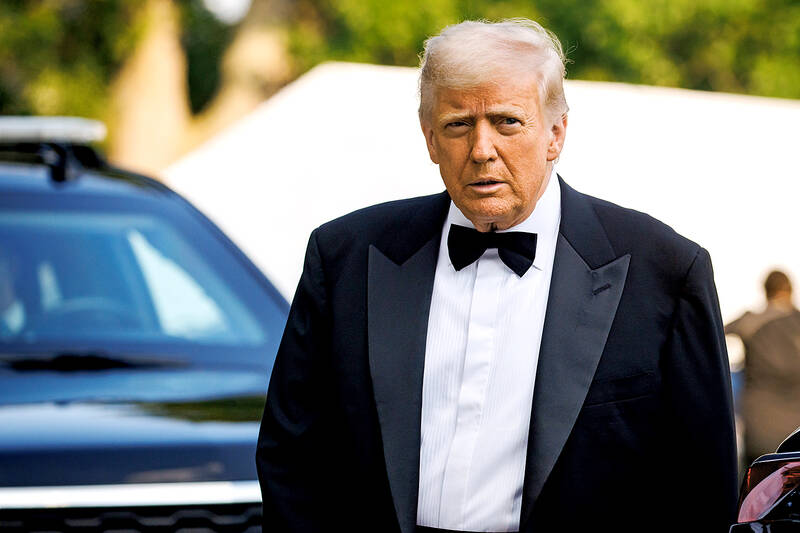US President Donald Trump on Wednesday said that he intended to send letters to trading partners in the next one to two weeks setting unilateral tariff rates, ahead of a July 9 deadline to reimpose higher duties on dozens of economies.
“We’re going to be sending letters out in about a week and a half, two weeks, to countries, telling them what the deal is,” Trump told reporters at the John F. Kennedy Center for the Performing Arts in Washington where he was attending a performance.
“At a certain point, we’re just going to send letters out. And I think you understand that, saying this is the deal, you can take it or leave it,” he added.

Photo: EPA-EFE
Trump in April announced higher tariffs on dozens of trading partners only to pause them for 90 days, as markets swooned and investors feared the levies would spark a global downturn.
It is unclear if Trump would follow through with his pledge. He has often set two-week deadlines for actions, only for them to come later or not at all.
Trump on May 16 said he would be setting tariff rates for US trading partners “over the next two to three weeks.”
After marathon talks between the US and China earlier this week in London, Trump on Wednesday said the trade framework with China had been completed and would have Beijing supply rare earths and magnets, with the US allowing Chinese students to study at US colleges and universities.
The US applies 55 percent tariffs on Chinese goods, Trump added.
This is a combination of his 30 percent additional levies this year and the rough average of pre-existing duties, a White House official said.
Trump said Beijing charges 10 percent duties on US goods.
Meanwhile, the US dollar extended its decline as worries over US tariffs increased after Trump said he would notify trading partners soon of unilateral levies.
The Bloomberg Dollar Spot Index yesterday slid as much as 0.6 percent to the lowest level since July 2023, extending the previous day’s drop spurred by softer US inflation data. The euro rose to its strongest since November 2021.
“[US] dollar weakness has much more room to run,” Aviva Investors senior economist and strategist Vasileios Gkionakis said.
The greenback’s weakness despite rising US Treasury yields show eroding investor confidence in US assets, he added.
Currency traders would have been monitoring US producer-price data due late yesterday for confirmation of subdued pressures. Traders would also be watching the upcoming G7 summit for any trade negotiation developments.

SEMICONDUCTOR SERVICES: A company executive said that Taiwanese firms must think about how to participate in global supply chains and lift their competitiveness Taiwan Semiconductor Manufacturing Co (TSMC, 台積電) yesterday said it expects to launch its first multifunctional service center in Pingtung County in the middle of 2027, in a bid to foster a resilient high-tech facility construction ecosystem. TSMC broached the idea of creating a center two or three years ago when it started building new manufacturing capacity in the US and Japan, the company said. The center, dubbed an “ecosystem park,” would assist local manufacturing facility construction partners to upgrade their capabilities and secure more deals from other global chipmakers such as Intel Corp, Micron Technology Inc and Infineon Technologies AG, TSMC said. It

NO BREAKTHROUGH? More substantial ‘deliverables,’ such as tariff reductions, would likely be saved for a meeting between Trump and Xi later this year, a trade expert said China launched two probes targeting the US semiconductor sector on Saturday ahead of talks between the two nations in Spain this week on trade, national security and the ownership of social media platform TikTok. China’s Ministry of Commerce announced an anti-dumping investigation into certain analog integrated circuits (ICs) imported from the US. The investigation is to target some commodity interface ICs and gate driver ICs, which are commonly made by US companies such as Texas Instruments Inc and ON Semiconductor Corp. The ministry also announced an anti-discrimination probe into US measures against China’s chip sector. US measures such as export curbs and tariffs

The US on Friday penalized two Chinese firms that acquired US chipmaking equipment for China’s top chipmaker, Semiconductor Manufacturing International Corp (SMIC, 中芯國際), including them among 32 entities that were added to the US Department of Commerce’s restricted trade list, a US government posting showed. Twenty-three of the 32 are in China. GMC Semiconductor Technology (Wuxi) Co (吉姆西半導體科技) and Jicun Semiconductor Technology (Shanghai) Co (吉存半導體科技) were placed on the list, formally known as the Entity List, for acquiring equipment for SMIC Northern Integrated Circuit Manufacturing (Beijing) Corp (中芯北方積體電路) and Semiconductor Manufacturing International (Beijing) Corp (中芯北京), the US Federal Register posting said. The

India’s ban of online money-based games could drive addicts to unregulated apps and offshore platforms that pose new financial and social risks, fantasy-sports gaming experts say. Indian Prime Minister Narendra Modi’s government banned real-money online games late last month, citing financial losses and addiction, leading to a shutdown of many apps offering paid fantasy cricket, rummy and poker games. “Many will move to offshore platforms, because of the addictive nature — they will find alternate means to get that dopamine hit,” said Viren Hemrajani, a Mumbai-based fantasy cricket analyst. “It [also] leads to fraud and scams, because everything is now